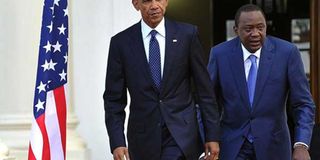Obama message was not totally unexpected

Presidents Barack Obama and Uhuru Kenyatta at State House, Nairobi. Mr Obama’s message was predictable. Their Excellencies weren’t going to present egos for tainting. AFP PHOTO | SAUL LOEB
What you need to know:
- Kenya and Ethiopia are two countries in a continent called Africa; grade school geography.
- It was common knowledge Mr Obama would visit the headquarters of the African Union in Addis Ababa, a first by a US president.
- As he himself said in reference to other events in Kenya and Africa, “It’s recent history.”
A week after US President Barak Obama visit to Kenya and Ethiopia, a footnote, possibly premature as these matters go, is in order.
First, however, here are two corrections.
Mr Obama wasn’t anywhere close to a tour of Africa, a phrase some American media used to pad stories.
Kenya and Ethiopia are two countries in a continent called Africa; grade school geography.
As for the two counties being a “hot bed” of terrorism, it’s an exaggeration, to be generous.
Suffice it to say that as far as personal security is concerned, here are modest comparisons.
Doing businesses and moving from point A to B, is as safe, or as dangerous, in Kenya’s Garissa and Ethiopia’s Moyale towns as in many parts of Brooklyn, NY, or South Side Chicago, Il. ad infinitum.
Remember, police cruisers are scarce commodities in Garissa and Moyale.
Back to the visit, beginning with Kenya.
It hasn’t been unusual for US presidents to visit the lands of their ancestors.
They were welcomed with enthusiasm. What’s historic about Obama’s visit is that the phenomenon isn’t a case of “Hardly anyone alive remembers:” It’s “Gee! How did all this happen?”
As he himself said in reference to other events in Kenya and Africa, “It’s recent history.”
His grandma is alive; so are most relatives, people who knew and worked with his father; his haunts exist, again ad infinitum.
Well, anyone who saw Rev Jessie Jackson, a hardened Civil Right Movement activist in the US in 1960s, shed tears of joy as Obama first won the presidency, should understand the enormity of emotions Kenyan have over the man’s accomplishments.
A spillover, and possibly of more consequences, is that Obama had no problems, well, “being Kenyan,” so to speak.
While acknowledging Kenya has made progress, noting “Kenya is a young country”, he reeled a list of what stands in the way of progress.
Topping the list: looting the Republic. Sounds familiar?
Mr Obama took the same message to Ethiopia.
There, though, he had to point out, albeit diplomatically, democratic deficits, including a malignant tumour that’s bound to stymie development: suppression of individual liberties.
DEMOCRACY
While Prime Minister Hailemariam Desalegn expressed his country’s commitment to democracy “as real and not skin deep,” he fell short of explaining how “coming out of centuries of undemocratic practices” can only lead to total domination of parliament by his political party.
It was common knowledge Mr Obama would visit the headquarters of the African Union in Addis Ababa, a first by a US president.
Ordinarily, it’s an occasion African heads of state and government would have attended.
That would have required the Assembly Chairman, Zimbabwe President Robert Mugabe, or one member supported by two thirds of the 54 to request a special secession.
None happened. Mr Obama’s message was predictable. Their Excellencies weren’t going to present egos for tainting.
It’s difficult to quarrel with much of alternative ways Obama said are needed for development and discarding idiotic traditions and ideas such like “I’m the only person who can hold this nation together.”
Anyway, Obama did what he could: put forth ideas.
In the long haul it’s for African nations to have steadfastness of purpose or remain in doldrums.




